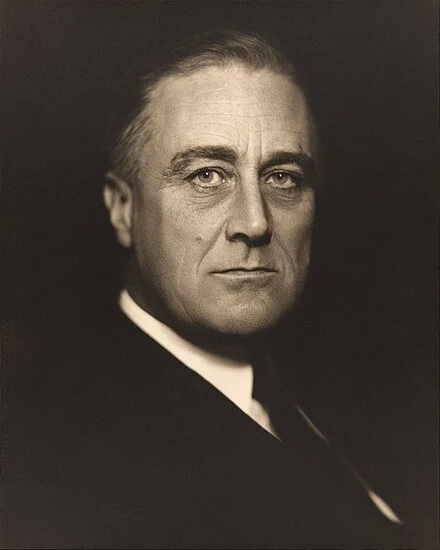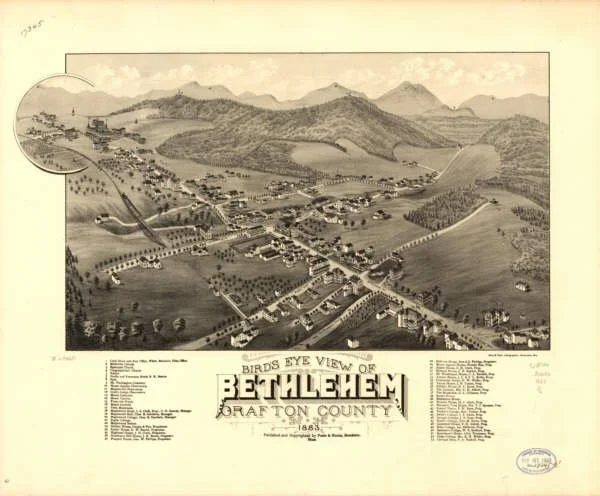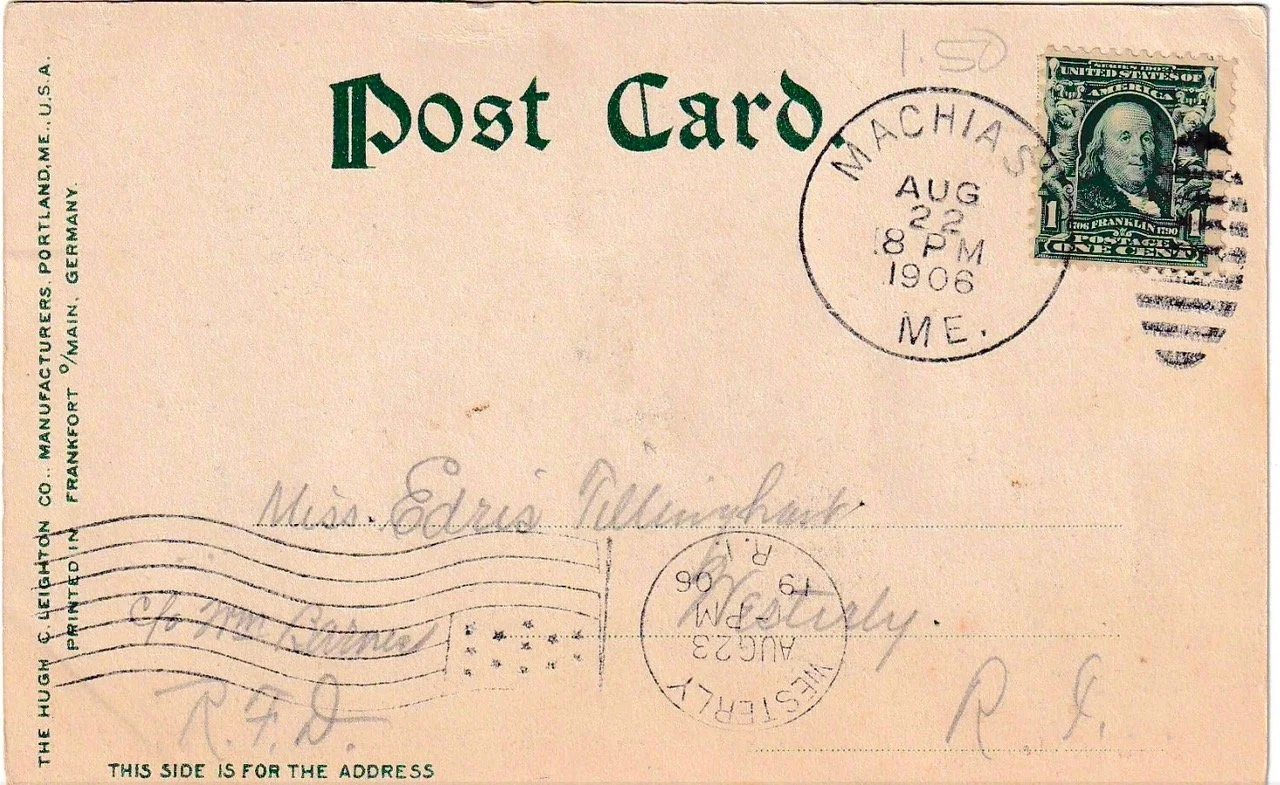
FDR talking to his ‘multitude of old friends’ in New England
FDR in the early '30's
Speech by Democratic presidential candidate Franklin D. Roosevelt in Boston on Oct. 31, 1932
Governor Ely, Mayor Curley, my friends of Massachusetts:
I am glad that a moment ago I had the privilege of standing under the flag of the Commonwealth of Massachusetts. There is a reason why I am particularly proud and happy of that. It is because, my friends, exactly one-half of me -- my mother's half -- comes from Massachusetts.
This trip to New England, I assure you, has brought back many happy memories. I have had a wonderful day from the early morning when I left the old school which I once attended and, where, I am told, I received some kind of culture, all the way up through Lawrence and Haverhill, and then on through New Hampshire and to Portland, Maine; and then this afternoon, coming back through the cities of Maine, New Hampshire and back into Massachusetts. I am more than ever convinced that those three States that I have visited today are going to be found in the Democratic column on November 8th.
I have met a multitude of old friends, with whom I have been associated in public life for more years than I care to tell you. If I were to start referring to each of them by name, I should have to call the roll of Massachusetts Democracy, and a good many of the Republicans as well. I appreciate the fact that today, a week before the election, we have a united party -- a party which, in securing a great victory on November 8th, will be supported not only by Democrats but by free-spirited Republican and independent voters. My only regret is that I could not have been here last Thursday night when Governor Smith was here. Anyway, the very day that he was here I had a good long talk with him, and I heard about the splendid and deserved welcome you gave him here in Boston.
Other memories, too, have come from far back beyond my earliest political experience. As a boy, I came to this State for education. To that education I look back with open and sincere pride and gratitude.
Then I came and lived not very far from here at a great institution for the freeing of the human mind from ignorance, from bigotry of the mind and the spirit. Knowledge -- that is, education in its true sense -- is our best protection against unreasoning prejudice and panic-making fear, whether engendered by special interests, illiberal minorities, or panic-stricken leaders who seek to perpetuate the power which they have misused.
I hope I have learned the lesson that reason and tolerance have their place in all things; and I want to say frankly that they are never so appropriate as when they prevail in a political campaign.
I say this with some feeling because I express widespread opinion when I note that the dignity of the office of President of the United States has suffered during the past week. The President began this campaign with the same attitude with which he has approached so many of the serious problems of the past three years. He sought to create the impression that there was no campaign going on at all, just as he had sought to create the impression that all was well with the United States, and that there was no depression.
But, my friends, the people of this country spoiled these plans. They demanded that the administration which they placed in power four years ago, and which has cost them so much, give an accounting. They demanded this accounting in no uncertain terms.
This demand of the people has continued until it has become an overwhelming, irresistible drift of public opinion. It is more than a drift. It is a tempest.
As that storm of approval for the Democratic policies has grown, several moods have come over the utterances of the Republican leader.
First, they were plaintively apologetic. Then the next move was indignation at the Congress of the United States. Finally, they have in desperation resorted to the breeding of panic and fear.
At first the President refused to recognize that he was in a contest. But as the people with each succeeding week have responded to our program with enthusiasm, he recognized that we were both candidates. And then, dignity died.
At Indianapolis he spoke of my arguments, misquoting them. But at Indianapolis he went further. He abandoned argument for personalities.
In the presence of a situation like this, I am tempted to reply in kind. But I shall not yield to the temptation to which the President yielded. On the contrary, I reiterate my respect for his person and for his office. But I shall not be deterred even by the President of the United States from the discussion of grave national issues and from submitting to the voters the truth about their national affairs, however unpleasant that truth may be.
The ballot is the indispensable instrument of a free people. It should be the true expression of their will; and it is intolerable that the ballot should be coerced -- whatever the form of coercion, political or economic.
The autocratic will of no man -- be he President, or general, or captain of industry -- shall ever destroy the sacred right of the people themselves to determine for themselves who shall govern them.
An hour ago, before I came to the Arena, I listened in for a few minutes to the first part of the speech of the President in New York tonight. Once more he warned the people against changing -- against a new deal -- stating that it would mean changing the fundamental principles of America, what he called the sound principles that have been so long believed in this country. My friends, my New Deal does not aim to change those principles. It does aim to bring those principles into effect.
Secure in their undying belief in their great tradition and in the sanctity of a free ballot, the people of this country -- the employed, the partially employed and the unemployed, those who are fortunate enough to retain some of the means of economic well-being, and those from whom these cruel conditions have taken everything -- have stood with patience and fortitude in the face of adversity.
There they stand. And they stand peacefully, even when they stand in the breadline. Their complaints are not mingled with threats. They are willing to listen to reason at all times. Throughout this great crisis the stricken army of the unemployed has been patient, law-abiding, orderly, because it is hopeful.
But, the party that claims as its guiding tradition the patient and generous spirit of the immortal Abraham Lincoln, when confronted by an opposition which has given to this nation an orderly and constructive campaign for the past four months, has descended to an outpouring of misstatements, threats and intimidation.
The administration attempts to undermine reason through fear by telling us that the world will come to an end on November 8th if it is not returned to power for four years more. Once more it is a leadership that is bankrupt, not only in ideals but in ideas. It sadly misconceives the good sense and the self-reliance of our people.
These leaders tell us further that, in the event of change, the present administration will be unable to hold in check the economic forces that threaten us in the period between Election Day and inauguration day. They threaten American business and American workers with dire destruction from November to March.
They crack the "whip of fear” over the backs of American voters, not only here but across the seas as well.
Ambassador Mellon, the representative of the United States at the Court of St. James's, an Ambassador who should represent the whole American people there -- every faith, the whole nation, Democrats, Republicans and Independents alike -- appeals to an English audience, on English soil, for the support of a party candidate 3000 miles away and invokes the same sinister threat and seeks to spread that threat to the rest of a civilized world.
I read somewhere in a history book about a Roman Senator who threw himself into a chasm to save his country. These gentlemen who represent us are of a new breed. They are willing to throw their country into a chasm to save themselves.
There is another means of spreading fear -- through certain Republican industrial leaders. I have said, without being controverted, that 5,000 men in effect control American industry. These men, possessed of such great power, carry likewise a great responsibility. It is their duty to use every precaution to see that this power is never used to destroy or to limit the sound public policy of the free and untrammeled exercise of the power of the ballot.
In violation of that duty, some of these 5,000 men who control industry are today invading the sacred political rights of those over whom they have economic power. They are joining in the chorus of fear initiated by the President, by the Ambassador, by the Secretary of the Treasury, and by the Republican National Committee.
They are telling their employees that if they fail to support the administration of President Hoover, such jobs as these employees have will be in danger. Such conduct is un-American and worthy of censure at the ballot box. I wonder how some of those industrial leaders would feel if somebody else's "baby had the measles.” In other words, would they agree that it would be equally reprehensible if any political leader were to seek reprisal against them -- against any coercing employer who used such means against political leaders? Let us fight our political battles with political arguments, and not prey upon men's economic necessities.
After all, their threats are empty gestures. You and I know that their industries have been sliding downhill. You know, and I know, that the whole program of the present administration has been directed only to prevent a further slipping downhill. You know, and I know, that therein lies the difference between the leaderships of the two parties.
You know, and I know, that the Democratic Party is not satisfied merely with arresting the present decline. Of course we will do that to the best of our ability; but we are equally interested in seeking to build up and improve, and to put these industries in a position where their wheels will turn once more, and where opportunity will be given to them to reemploy the millions of workers that they have laid off under the administration of President Hoover.
It is not enough merely to stabilize, to lend money! It is essential to increase purchasing power in order that goods may be sold. There must be people capable of buying goods in order that goods may be manufactured and sold. When that time comes, under our new leadership, these same gentlemen who now make their threats will be found doing business at the old stand as usual.
The American voter, the American working-man and working woman, the mill-worker of New England, the miner of the West, the railroad worker, the farmer, and the white-collar man will answer these silly, spiteful threats with their ballots on November 8th.
As I have pointed out before in this campaign, in a good many States and during many weeks, the fruits of depression, like the fruits of war, are going to be gathered in future generations. It is not the pinch of suffering, the agony of uncertainty that the grown-up people are now feeling that count the most; it is the heritage that our children must anticipate that touches a more vital spot. It is not today alone that counts. Under-nourishment, poor standards of living and inadequate medical care of today will make themselves felt among our children for fifty years to come….
It is the same for you -- workers in industry and in business. There are none of us who do not hope that our children can get a better break than we have had, that the chance for an education, for a reasonable start in life, may be passed on to our children, an opportunity for them built out of the hard work of our own hands. We want them to have opportunity for profitable character building -- decent, wholesome living -- good work, and good play. We want to know somehow that, while perfection does not come in this world, we do try to make things better for one generation to another….
Against this enemy every ounce of effort and every necessary penny of wealth must be raised as a defense. It is not that we lack the knowledge of what to do. The tragedy of the past years has been the failure of those who were responsible to translate high-sounding plans into practical action. There's the rub.
The present leadership in Washington stands convicted, not because it did not have the means to plan, but fundamentally because it did not have the will to do. That is why the American people on November 8th will register their firm conviction that this administration has utterly and entirely failed to meet the great emergency.
The American people are heart-sick people for "hope deferred maketh the heart sick.”
……
Now, my friends, we are considering unemployment tonight, and I am going to start by setting forth the positive policy which the President's Commission under the leadership of the Secretary of Commerce urged should be done. There is a lot of it which is still good.
It was a 5-point program. And as a program it was good.
First, it urged that government should reduce expenditures for public works during periods of prosperity, and that, during those periods, government should build up reserves with which to increase expenditures during periods of unemployment and industrial depression. But was that done? Not one penny's worth. No reserves were built up for the rainy day.
Second, the report said that the Federal Government should work with the railroads in the preparation of a long-time constructive program. Was that done? No. The Republican Administration did not give effect to this proposal. Instead of working with the railroads, to consolidate their lines and put them on a sound economical basis, the administration waited until the depression had laid them low, and then had nothing for them except to loan them more money, when they were already heavily in debt.
Third, the report proposed the setting up of safeguards against too rapid inflation, and consequently too rapid deflation of bank credit. As I have shown, the President and his Secretary of the Treasury went to the other extreme and encouraged speculation.
Fourth, the report recommended an adequate system of unemployment insurance. No one in the administration in Washington has assumed any leadership in order to bring about positive action by the States to make this unemployment insurance a reality. Someday, in our leadership, we are going to get it.
Fifth, it suggested an adequate system of public employment offices. But when Senator Wagner introduced a bill to establish Federal employment offices, President Hoover vetoed the measure that Secretary Herbert Hoover had sponsored. It seems to me, speaking in this great section of the country where there are so many business men, that business men who believe in sound planning and action, must feel that there is danger to the country in the continuance of a leadership that has shown such incapacity, such ineptitude, such heedlessness of common sense and of sound business principles. What we need in Washington is less fact finding and more thinking.
Immediate relief of the unemployed is the immediate need of the hour. No mere emergency measures of relief are adequate. We must do all we can. We have emergency measures but we know that our goal, our unremitting objective, must be to secure not temporary employment but the permanence of employment to the workers of America. Without long-range stability of employment for our workers, without a balanced economy between agriculture and industry, there can be no healthy national life.
We have two problems: first, to meet the immediate distress; second, to build up a basis of permanent employment.
As to "immediate relief,” the first principle is that this nation, this national government, if you like, owes a positive duty that no citizen shall be permitted to starve. That means that while the immediate responsibility for relief rests, or course, with local, public and private charity, in so far as these are inadequate the States must carry on the burden, and whenever the States themselves are unable adequately to do so the Federal Government owes the positive duty of stepping into the breach.
It is worth while noting that from that disastrous time of 1929 on the present Republican Administration took a definite position against the recognition of that principle. It was only because of the insistence of the Congress of the United States and the unmistakable voice of the people of the United States that the President yielded and approved the National Relief Bill this summer.
In addition to providing emergency relief, the Federal Government should and must provide temporary work wherever that is possible. You and I know that in the national forests, on flood prevention, and on the development of waterway projects that have already been authorized and planned but not yet executed, tens of thousands, and even hundreds of thousands of our unemployed citizens can be given at least temporary employment.
Third, the Federal Government should expedite the actual construction of public works already authorized. The country would be horrified if it knew how little construction work authorized by the last Congress and approved by the President has actually been undertaken on this date, the 31st of October. And I state to you the simple fact that much of the work for which congress has given authority will not be under way and giving employment to people until sometime next summer.
Finally, in that larger field that looks further ahead, we call for a coordinated system of employment exchanges, the advance planning of public works, and unemployment reserves. Who, then, is to carry on these measures and see them through? The first, employment exchanges, is clearly and inescapably a task of the Federal Government, although it will require the loyal and intelligent cooperation of State and local agencies throughout the land. To that Federal action I pledge my administration. The second, the advance planning of public works, again calls for a strong lead on the part of the government at Washington. I pledge my administration to the adoption of that principle, both as to enterprises of the Federal Government itself and as to construction within the several States which is made possible by Federal aid; and I shall urge upon State and local authorities throughout the nation that they follow this example in Washington. The third, unemployment reserves, must under our system of government be primarily the responsibility of the several States. That, the Democratic platform, on which I stand, makes entirely clear.
In addition to all this, there has been long overdue a reduction of the hours of work and a reduction of the number of working days per week. After all, the greatest justification of modern industry is the lessening of the toil of men and women. These fruits will be dead fruits unless men earn enough so that they can buy the things that are produced, so that they can have the leisure for the cultivation of body, mind and spirit, which the great inventions are supposed to make possible. That means that government itself must set an example in the case of its own employees. It means also that government must exert its persuasive leadership to induce industry to do likewise.
Here then is a program of long-range planning which requires prompt and definite action and the cooperation of Federal and State and local governments, as well as of forward-looking citizens of both parties throughout the land. The proposals are specific, they are far-reaching. To advocate a less drastic program would be to misread the lessons of the depression and to express indifference to the country's future welfare.
There is one final objective of my policy which is more vital and more basic than all else. I seek to restore the purchasing power of the American people. The return of that purchasing power, and only that, will put America back to work.
We need to restore our trade with the world. Under Republican leadership we have lost it, and the President of the United States seems to be indifferent about finding it again.
And now I am going to talk to a city audience about farming. I do not make one kind of speech to a farm audience and another kind of speech to a city audience. We need to give to fifty million people, who live directly or indirectly on agriculture, a price for their products in excess of the cost of production. You know how and why that affects us in the cities. To give them an adequate price for their products means to give them the buying power necessary to start your mills and mines to work to supply their needs. Fifty million people cannot buy your goods, because they cannot get a fair price for their products. You are poor because they are poor.
I favor -- and do not let the false statements of my opponents deceive you -- continued protection for American agriculture as well as American industry. I favor more than that. I advocate, and will continue to advocate, measures to give the farmer an added benefit, called a tariff benefit, to make the tariff effective on his products. What good does a 42-cent tariff on wheat mean to the farmer when he is getting 30 cents a bushel on his farm? That is a joke. The most enlightened of modern American businessmen likewise favor such a tariff benefit for agriculture. An excellent example is your own fellow Bostonian, Mr. Harriman, President of the Chamber of Commerce of the United States, who has recently proclaimed a plan for the restoration of agriculture not unlike my own.
The President of the United States does not favor a program of that kind, or, so far as I can make out, of any practical kind. He has closed the door of hope to American agriculture, and when he did that, he closed the door of hope to you also.
He says proudly that he has effectively restricted immigration in order to protect American labor. I favor that; but I might add that in the enforcement of the immigration laws too many abuses against individual families have been revealed time and time again.
But when the President speaks to you, he does not tell you that by permitting agriculture to fall into ruin millions of workers from the farms have crowded into our cities. These men have added to unemployment. They are here because agriculture is prostrate. A restored agriculture will check this migration from the farm. It will keep these farmers happily, successfully, at home; and it will leave more jobs for you. It will provide a market for your products, and that is the key to national economic restoration.
One word more. I have spoken of getting things done. The way we get things done under our form of government is through joint action by the President and the Congress. The two branches of government must cooperate if we are to move forward. That is necessary under our constitution, and I believe in our constitutional form of government.
But the President of the United States cannot get action from the Congress. He seems unable to cooperate. He quarreled with a Republican Congress and he quarreled with a half Republican Congress. He will quarrel with any kind of Congress, and he cannot get things done.
That is something that the voters have considered and are considering and are going to remember one week from tomorrow. You and I know, and it is certainly a fact, that the next Congress will be Democratic. I look forward to cooperating with it. I am confident that I can get things done through cooperation because for four years I have had to work with a Republican Legislature in New York.
I have been able to get things done in Albany by treating the Republican members of the Legislature like human beings and as my associates in government. I have said that I look forward to the most pleasant relations with the next Democratic Congress, but in addition to that let me make it clear that on that great majority of national problems which ought not to be handled in any partisan manner, I confidently expect to have pleasant relations with Republicans in the Senate and the House of Representatives as well as with Democrats.
After the fourth of March, we -- meaning thereby the President and the members of both parties in the Halls of Congress -- will, I am confident, work together effectively for the restoration of American economic life.
I decline to accept present conditions as inevitable or beyond control. I decline to stop at saying, "It might have been worse.” I shall do all that I can to prevent it from being worse but -- and here is the clear difference between the President and myself -- I go on to pledge action to make things better.
The United States of America has the capacity to make things better. The nation wants to make things better. The nation prays for the leadership of action that will make things better. That will be shown in every State in the Union -- all 48 of them -- a week from tomorrow. We are through with "Delay” we are through with "Despair”; we are ready, and waiting for better things.
The world to come?
“WAR IN HEAVEN II: Battle for the Soul of the Planet” (carved poplar), by C.A. Stigliano, in the show with Sally B. Moore “Figuring Our World,’’ at Brickbottom Gallery, Somerville, Mass., through Sept. 28.
The gallery says the show “holds a lens to the modern day and allows artists Moore and Stigliano to talk to each other about what is happening in the world around us right now. Both artists, who primarily use figure in their work, approach the topic in slightly different ways.
“Moore suggests the precariousness of the human predicament as we teeter on the brink of our own bad planning, seemingly unable to look forward or backward.
“Meanwhile, Stigliano tends to focus on the darker side of the contemporary world. His relief work, in particular, speaks not only of our current state of affairs, but of darker times to come.’’
"Encounter,'' by Sally B . Moore.
‘Often seen, seldom felt’
A Field of Stubble, lying sere
Beneath the second Sun—
Its Toils to Brindled People
Its Triumphs—to the Bin—
Accosted by a timid Bird
Irresolute of Alms—
Is often seen—but seldom felt,
On our New England Farms—
By Emily Dickinson (1830-1886). See The Belle of Amherst a 1976 play based on her work.
Ferocious future
By Juls Gabs, in the show "Landscape of Future Era Today,'' at HallSpace, Dorchester, Mass., through Oct. 12.
The gallery says:
“The show looks ahead at the landscapes of tomorrow and their potential to be scarred by pollution, smog, industry and extreme weather. The show ‘challenges us to rethink our vision of nature and confront the impact of our commodities,’ according to an artist statement, and juxtaposes this grim future with the ‘grandiosity of past indulgence.’’’
Llewellyn King: Am I remembering too much?
Cocktail party in 1961
WEST WARWICK, R.I.
I am approaching what may be thought of as a significant birthday next month. I’m not sure what makes it significant except the number attached to it.
If we don’t know how old we are, most people, including the elderly, will think they are younger, even if they have arthritic knees. If they take a morning cocktail of pills, they will still think they are much younger than the calendar dictates.
So here is my guide to knowing empirically, how old you are. You are old if ….
You remember when all restaurants served half a grapefruit with a half a maraschino cherry placed in the middle.
You remember when restaurants had relish carts with things like watermelon pickles and herring in sour cream.
You remember a whole class of singers called crooners and you still get a bit weepy when you hear their songs.
You remember when men’s trousers had buttons instead of zippers.
You remember when women wore girdles with attachments for stockings.
You remember when cars had little arms for turn signals, called trafficators, that wouldn’t go up at speed.
You remember when airline tickets were as good as currency and could easily be exchanged or sold back.
You remember when flying was a pleasure, even in coach, and you felt pampered not herded.
You remember when hotel rooms were rented for fixed prices and those were posted.
You remember when sneakers were all white and for tennis.
You remember when men wore hats and baseball caps were worn just to play baseball.
You remember when women wore hats and gloves to church.
You remember when men wore suits to church or just put them on so their neighbors thought they had been at worship.
You remember when birth control, if available, was with condoms, known as rubbers and kept under the counter at drugstores.
You remember when drugstores also had lunch counters.
You remember soda fountains.
You remember when Coca-Cola only came in a 6-ounce bottle and tasted better because it had cane sugar and the bottle seemed to concentrate the carbonation. Also, it cost a dime.
You remember five and dime stores where some things really cost only a dime.
You remember when shopping centers were novel and a place to visit.
You remember when going to the movies was an occasion. An usher showed you to your seat with a flashlight and a popcorn, ice cream and candy vendor walked up and down the theater aisles.
You remember when cigarettes were offered at dinner and ashtrays were part of the table setting.
You remember when Americans didn’t drink wine and only glasses for hard liquor were on formal dinner tables.
You remember when ethnic food was Hunan Chinese, often called Polynesian, and French food wasn’t regarded as ethnic, simply hard to pronounce.
You remember a time when comfort wasn’t important to you, when you didn’t ask, “Are the beds comfortable?” And when on a road trip, you didn’t expect to sit in the front seat because “it is more comfortable.”
Recently, a woman — who had been to a few rodeos herself — looked at me and said, “You’ve got age on you.” I was about to remonstrate, but I realized that while her manners were wanting, her eyesight wasn’t.
Therefore, I shall be bowing to the calendar and, after next month, I will gladly let people hold doors for me, help me with grocery bags, and offer a chair when there is a lot of standing about going on.
My wife is taking me to Montreal for the big day, but I plan to treat it as nothing to do with moi. Other people get old. They always have -- as I remember.
Llewellyn King is executive producer and host of White House Chronicle, in PBS. His email is llewellynking1@gmail.com and he’s based in Rhode Island.
Michael Scott Bryant: When 'charisma,' er, Trumps all else
Trump at rally in Manchester, N.H., last January
SMITHFIELD, R.I.
Of all the questions confronting voters in the 2024 U.S. presidential election, few are as puzzling as the seemingly unwavering support for a political candidate deeply mired in embarrassing sex scandals and criminal business practices.
Such is the case with Donald Trump, whose behavior would have sunk the campaigns of most U.S. presidential candidates.
In the 1980s, for example, Democrat Gary Hart’s presidential ambitions went to ground over allegations of extramarital affairs on a boat aptly named “Monkey Business.” Over the past 20 years, two New York governors, Andrew Cuomo and Eliot Spitzer, both Democrats, resigned over charges of sexual misconduct. Democrat Al Franken’s career in the Senate was scuttled over charges of indiscretions during a USO tour.
But Trump’s convictions of financial fraud and being found culpable for sexual misconduct have not dampened the enthusiasm of supporters of Trump and his “Make America Great Again” movement.
Part of the reason may be explained by Max Weber, an early 20th century German sociologist and social theorist. At the center of Weber’s thinking about political authority was the word “charisma.”
In today’s street lingo, charisma has been shortened to “rizz” and defined by the Oxford English Dictionary as “style, charm or attractiveness, and the ability to attract a romantic or sexual partner.”
Nothing could be further from Weber’s understanding of charisma.
The religious roots of charisma
In his “Theory of Social and Economic Organization,” Weber goes back to the Christian roots of the word charisma to describe how social and political power achieved legitimacy within a society.
According to the Greek Bible, Jesus’ followers received spiritual gifts from God. Much later, derived from the Greek word “charis” – meaning “grace, kindness, favor – the word was brought over to English and referred to the gifts of healing, prophecy and other endowments of the Holy Spirit.
A portrait of the German sociologist Max Weber in the 1900s. Mondadori via Getty Images
For Weber, what makes people charismatic is the possession of such gifts, through which they become mediators between God and their communities.
These gifts of the spirit transform the believer into a prophet.
Weber made a crucial distinction between a priest and a prophet. The priest acquires power through official credentialing and the routine performance of functions such as liturgies and rituals prescribed by the religion.
In contrast with the priest, the prophet derives authority not from official mechanisms but directly from God. The prophet thus stands outside the framework of the official religion – and even beyond society and a political state.
What characterizes the modern-day prophet is his defiance of the regimented order of society and his call to heed a higher calling. The prophet is inherently subversive.
While not religious, as historian Lawrence Rees has pointed out, the political prophet is "quasi-religious,” and the followers of such a person “are looking for more than just lower taxes or better health care, but seek broader, almost spiritual, goals of redemption and salvation.”
‘A call to arms’
Throughout modern history, charismatic leaders have shown their extraordinary ability to elicit devotion to themselves and their causes.
Some have been great spiritual leaders – Russian writer Leo Tolstoy, Indian independence leader Mahatma Gandhi, Civil Rights Movement leader Rev. Martin Luther King Jr. and South African freedom fighter Nelson Mandela among them.
A portrait of German Nazi leader Adolph Hitler. Hulton-Deutsch Collection/CORBIS/Corbis via Getty Images
Others have been a scourge to humans – including Russian leader Josef Stalin, German dictator Adolf Hitler, Chinese Communist leader Mao Zedong and cult leader Jim Jones.
Of those charismatic “prophets,” none may have possessed more charisma than Hitler. He was the prototype of a charismatic leader, according to Weber’s definition.
Like the prophets of old, Hitler was an outsider who possessed remarkable gifts of oratory and uncanny good luck. Of his charismatic traits, none was more important than his ability to persuade. One early follower, Kurt Lüdecke, highlighted the power of a Hitler speech in 1922:
“When he spoke of Germany’s disgrace I felt ready to spring on an enemy. His appeal to German manhood was like a call to arms, the gospel he preached a sacred truth. He seemed another (Martin) Luther. I forgot everything but the man. Glancing around, I saw that his magnetism was holding these thousands as one.”
In his “Inside the Third Reich,” Albert Speer confessed that his decision to join Hitler’s movement was emotional rather than intellectual: “In retrospect, I often have the feeling that something swooped me up off the ground at the time, wrenched me from all my roots, and beamed a host of alien forces upon me.”
Speer was later convicted of war crimes and crimes against humanity.
Trump’s charisma
Weber’s concept of charisma helps us understand Trump’s appeal to his Christian followers.
Trump portrays himself as an outsider who will attack the decadent mainstream system – and his followers are willing to fight and die for him.
Indeed, the Jan. 6, 2021, rioters risked their freedom, their careers and, in at least one case, their lives for their leader. One of them, Ashli Babbitt, was fatally shot climbing through a shattered glass door inside the U.S. Capitol.
The list of lives and careers who were imprisoned as a result of service to Trump includes former Trump campaign manager Paul Manafort, ex-Trump “fixer” Michael Cohen and former Trump adviser Steve Bannon, among others.
Meanwhile, several ex-Trump lawyers have suffered or are facing disbarment and, in some cases, criminal charges related to their work for the Trump administration.
It’s my belief that Trump is not just an ordinary politician – people think he is a spiritual leader offering to bring them to the promised land.
Republican presidential nominee Donald Trump speaks at a campaign rally in Johnstown, Pa., on Aug. 30, 2024. Justin Merriman/Getty Images
Right-wing evangelicals such as Paula White, Tony Perkins and Hank Kunneman praise him as a man fulfilling God’s will through his actions.
Social media is filled with images of Trump being supported by Jesus, or even of Trump being crucified like Jesus.
And Trump himself has said that divine intervention saved him from an assassin’s bullets.
“And I’d like to think that God thinks that I’m going to straighten out our country,” Trump told Fox News host Mark Levin in September 2024. “Our country is so sick, and it’s so broken. Our country is just broken.”
A critical flaw
But the Achilles’ heel of the charismatic leader is lack of success.
In the case of Hitler, his battlefield failures in Dunkirk and Stalingrad during World War II punctured the charismatic balloon. But rebellions against his authority were fruitless, and Hitler was able to command obedience until his suicide in April 1945.
The need for continuous success is a cautionary tale for Trump, whose charisma appears to be ebbing.
Trump’s reputation as a winner took a blow with his loss to Joe Biden in the 2020 election. With Biden’s decision to drop out of the race, Vice President Kamala Harris has made the 2024 presidential campaign a much closer race.
If the erosion continues, Trump will likely confront the fates of all failed prophets – to be barred access to the levers of power they crave.
Michael Scott Bryant is a professor of History and Legal Studies at Bryant University, in Smithfield, R.I.
Disclosure statement
Michael Scott Bryant does not work for, consult, own shares in or receive funding from any company or organization that would benefit from this article, and has disclosed no relevant affiliations beyond their academic appointment.
Mother and daughter work it out
Collage featuring copper enameled decal and opal earring and 24k Kuemboo, opal sterling ring in the show "Layered Together,'' at the Gallery at WREN in Bethlehem, N.H.
The gallery says:
“This intergenerational display showcases the intertwined artistic journeys of mother and daughter Beth Simon and Ana Koehler. Beth’s distinctive crafted jewelry, alongside Ana’s evocative paintings of the female form, take center stage.’’
New England stone walls house many creatures
Excerpted/edited from an ecoRI News article by Colleen Cronin
LITTLE COMPTON, R.I.
A look at a stone wall on Roger and Gail Greene’s property — they guessed the structure dates back to the early 1800s or even late 1700s — suggests that every rock and cranny is a world unto its own.
A black cherry tree stretched its way up and out from underneath — a gift likely planted by a bird who had perched on its stones decades ago, Roger said. Minty green lichen made splotches on gray rocks. A pickerel frog with skin like a snake hopped its way through leaf litter and low grasses to a hiding space before an ecoRI News reporter could get a good photo.
Stone walls originally marked the boundaries of farms, but now they have become homes to many different types of creatures.
William Morgan: Ruminations on an old postcard from Maine
Porter Memorial Library, Machias, Maine. Hand-colored postcard.
Once again, an antique postcard yields memories as well as mysteries. My investment of $1.50 to buy an old card led to down-the-rabbit-hole ruminations.
Posted in Machias on Aug. 22, 1906 (Theodore Roosevelt was President); Maine had been a state for only 86 years. The sender, from what we can make out from the pencil scratches on the picture side of the card, was the sister of the recipient, Miss Edris Tillinghast. Tillinghast is a Rhode Island name, but Edris strikes one as one of those late Victorian family names, yet it is well enough known in Wales. Was Miss Edris visiting in Westerly? (Her address is in care of “Wm. Barnes, RFD” (Rural Free Delivery) – her family rusticating on a farm, perhaps)? Or was the sister traveling in far Downeast Maine?
Post card from Hugh C. Leighton Co., Portland, but printed in Germany
The Tillinghast sisters and their undocumented peregrinations may had faded into the mists of time, but the library building in the Washington County seat has remained pretty much unchanged. Chicago businessman and Machias native Henry Holmes Porter gave the money to erect the library in memory of his father, Rufus King Porter, in 1891.
The architect of the Porter Library was George Clough, who hailed from Blue Hill, Maine, and was a successful practitioner in Boston. He designed the Suffolk County Courthouse, on Pemberton Square, Boston, and he was that city’s first City Architect, a position to which he was elected in 1876 and served for seven years. He also designed the public libraries for the Maine towns of Rockland, Bucksport and Vinalhaven.
Postcard of Buck Memorial Library, Bucksport.
Clough’s inspiration for Machias was the Romanesque Revival-style libraries of Henry Hobson Richardson in such suburban Boston towns as Woburn, North Easton and Quincy. Richardson was best known as the architect of Trinity Church at Copley Square in Boston, but his small-town libraries are among his most satisfying works. Clough was one of many New England library builders who borrowed from the Richardsonian formula of monumental reading room, wing for the stacks and ceremonial civic entrance.
Crane Memorial Library, by Henry Hobson Richardson, in Quincy, Mass.
-- Photo by William Morgan
Providence-based writer and photographer William Morgan is the author of a number of books on New England architecture, including A Simpler Way of Life: Farmhouses of New York and New England and Monadnock Summer: The Architectural Legacy of Dublin, New Hampshire.
ADU’s in tight cities
Thames Street, the best-known retail strip in Newport. (Photo by Kenneth C. Zirkel)
Adapted from Robert Whitcomb’s “Digital Diary,’’ in GoLocal24.com
Tight little Newport, R.I. and many other places, seek to address the housing shortage and cost by encouraging the construction of accessory dwelling units (ADUs) on owner-occupied residential property. This housing is generally supposed to be primarily for elderly and/or disabled people, and in The City by the Sea would be limited to one-bedroom and studio units of no more than 900 square feet and two-bedroom units at 1,200 square feet.
Certainly creating more space for the elderly, the fastest-growing part of the population, is a fine idea! Rhode Island is ranked as eleventh among the states in its percentage of people 65 and over. We’ll see if many much younger people end up living in the ADU’s, whatever the laws. Meanwhile, using them for short-term rentals – a temptation in mega summer resort city Newport – is banned. All this will be tough to monitor.
Then there’s the always tricky parking issue. While the new rules say that no additional parking would be required for a new ADU, currently required parking removed as part of building an ADU would have to be replaced.
I’ll be curious to see if many people without cars move into the ADU’s, opting to rely on bikes, Uber and Lyft, and public transit instead. Maybe many of them will be young adults.
In any event, increasing the supply of housing is essential, but tough. Too many people oppose greater density, even as the population swells. They want wide-open spaces in their neighborhoods.
‘Seducing guests’
“Self Portrait,’’ by Connecticut photographer Adrien Broom, in her show “Mystical Murmurs: An Enchanted Environment,’’ at the Florence Griswold Museum, Old Lyme, Conn., Sept. 28-Nov. 3
The museum explains:
“In this immersive exhibition contemporary artist, photographer, set designer, and filmmaker Broom (b. 1980) invites audiences to experience the mysterious world of the forest and imagine themselves at faerie-scale. Encounter a magical installation inspired by the natural environment and folklore. Drawing on medieval European folk beliefs and superstitions, visitors are enticed to step inside an oversized mushroom ring, triggering entrancing songs, and seducing guests to dance beyond time.’’
Chris Powell: What do college demonstrators in Conn. and elsewhere mean by ‘Free Palestine’?
Pro-Palestinian demonstration by students near Harvard University, in Cambridge, Mass.
MANCHESTER, Conn.
College is back in session and students are returning not just to their studies but also to protests on campus about the war in Gaza. At the University of Connecticut at Storrs, Yale University in New Haven, and other institutions, students are chanting and carrying signs reading "Free Palestine!"
Journalism not being what it used to be, since literacy and civic engagement aren't either, no one seems to be asking the students exactly what they mean by "Free Palestine!" and how that objective should be achieved.
So how do the student protesters define Palestine? Do they define it as most Palestinians themselves do, as encompassing the land "from the river to the sea" -- the land between the Jordan River and Mediterranean -- thus liquidating Israel, as Palestinians often have tried to do in war since the area was partitioned into Jewish and Arab sections by resolution of the United Nations in 1948, and as they are doing again now?
Do the student protesters define Palestine as something that leaves room for Israel -- a Palestine consisting of Gaza, which Israel evacuated in 2005, and the "occupied West Bank," the land between Jordan and Israel proper, most of which Israel agreed to evacuate during negotiations sponsored by President Bill Clinton in 2000?
If the student protesters define Palestine as the Clinton plan did, they might want to ask the people on whose behalf they're protesting why they can't accept such a compromise even now that the war that Gaza launched against Israel last October has brought catastrophic bloodshed and ruin to the territory. The students should explain why Palestinian irredentism is worth so much.
And what do the student protesters mean by "free"? Do they mean civil liberties -- speech, press, assembly, religion, due process of law, women's rights, and sexual orientation -- liberties enjoyed in the United States, Western Europe, and Israel, but not in Gaza and West Bank areas under Palestinian control, nor, indeed, anywhere in the Arab world? If that's what the student protesters mean, they should go to Gaza or the West Bank and try to exercise such freedoms there, after making provision for the transport home of their corpses.
Or do the student protesters understand "free Palestine" as most Palestinians appear to understand it -- a land free of Jews, a land free to attack a neighboring state and people, bombarding, murdering, raping, and kidnapping whenever the necessary strength has been regained during another "ceasefire"?
Yes, the war in Gaza is horrifying. But then wars against totalitarians seldom can be won politely. The war against the totalitarian aggressors of World War II, Germany and Japan, were won only by leveling both countries, killing millions of civilians, and then remaking the totalitarian societies through long military occupations.
If the student protesters think there is another way, they should spell it out and offer it to the warring parties. They may find, as Clinton did, that making peace requires more than pious hand-wringing on a peaceful campus far away from cutthroats whose hatred and brutality far surpass anything the students can imagine.
TREATMENT ISN'T ENOUGH: School officials and social workers report that Connecticut is facing an epidemic of mental illness among young people -- not just teens in high school but also children in elementary and middle school. There is clamor for state government to spend more for treatment and school mental-health clinics, as if that will solve the problem.
Little attention is being paid to the cause of the youth mental-illness epidemic. The recent virus epidemic and its disruption of school and home life is an easy explanation, but that epidemic is long over. Something else must be wrong. Child neglect was already bad when the virus struck. Because inflation soared during much of the time since the epidemic started, real incomes for many have fallen. That may have worsened neglect.
Treatment isn't enough. The General Assembly and Gov. Ned Lamont should strive to discern and eradicate the causes of youth mental illness.
Chris Powell has written about Connecticut government and politics for many years (CPowell@cox.net).
Where we all end up
"From the Wreckage" (collage, screenprint, cut book pages, acrylic paint, charcoal, paper bag, Sumi-e ink, sand), by Michele L'Heureux, at the Narrows Center for the Arts, Fall River, Mass.
-- Photo by the Artist
Llewellyn King: Coming soon — AI travel agents instead of human ones
Your agents? The word "robot" was coined by Karel Čapek in his 1921 play R.U.R. — standing for "Rossum's Universal Robots".
WEST WARWICK, R.I.
The next big wave in innovation in artificial intelligence is at hand: agents.
With agents, the usefulness of AI will increase exponentially and enable businesses and governments to streamline their operations while making them more dependable, efficient and adaptable to circumstance, according to Satya Nitta, co-founder and CEO of Emergence, the futuristic New York-based computer company.
These are the first AI systems that can both speak with humans and each other conversationally, which may reduce some of the anxiety people feel about AI — this unseen force that is set to transform our world. These agents use AI to perceive their environment, make decisions, take actions and achieve goals autonomously, Nitta said.
The term “situational awareness” could have been created for agents because that is the key to their effectiveness.
For example, an autonomous vehicle needs a lot of awareness to be safe and operate effectively. It needs every bit of real-time knowledge that a human driver needs on the roadway, including scanning traffic on all sides of the vehicle, looking out for an approaching emergency vehicle or a child who might dash into the road, or sensing a drunk driver.
Emergence is a well-funded startup, aiming to help big companies and governments by designing and deploying agents for their most complex operations.
It is perhaps easier to see how an agent might work for an individual and then extrapolate that for a large system, Nitta suggested.
Take a family vacation. If you were using an agent to manage your vacation, it would have to have been fed some of your preferences and be able to develop others itself. With these to the fore, the agent would book your trip, or as much of it as you wished to hand to the agent.
The agent would know your travel budget, your hotel preferences and the kinds of amusements that would be of interest to your family. It would do some deductive reasoning that would allow for what you could afford and balance that with what is available. You could discuss your itinerary with the agent as though it were a travel consultant.
Nitta and Emergence are designing agents to manage the needs of organizations, such as electric utilities and their grids, and government departments, such as education and health care. Emergence, along with several other AI companies and researchers, has signed a pledge not to work on AI for military applications, Nitta said.
Talking about agents that would be built on open-source Large Language Models and Large Vision Models, Nitta said, “Agents are building blocks which can communicate with each other and with humans in natural language, can control tools and can perform actions in the digital or the physical world.”
Nitta explained further, “Agents have some functional capacity. To plan, reason and remember. They are the foundations upon which scalable, intelligent systems can be built. Such systems, composed of one or more agents, can profoundly reshape our ideas of what computers can do for humanity.”
This prospect is what inspired the creation of Emergence and caused private investors to plow $100 million in equity funding into the venture, and lenders to pledge lines of credit of another $30 million.
Part of the appeal of Emergence’s agents is that they will be voice-directed and you can talk to them as you would to a fellow worker or employee, to reason with them, perhaps.
Nitta said that historically there have been barriers to the emergence of voice fully interfacing with computing. And, he said, there has been an inability of computers to perform more than one assignment at a time. Agents will overcome these blockages.
Nitta’s agents will do such enormously complex things as scheduling the inputs into an electricity grid from multiple small generators or calculating weather, currents and the endurance of fishing boats and historical fish migration patterns to help fishermen.
At the same time, they will be adjusting to changes in their environment, say, for the grid, a windstorm, or the fish are turning south not east, as expected, or if the wholesale price of fish has dropped to change the economics of the endeavor.
To laymen, to those who have been awed by the seeming impregnable world of AI, Emergence and its agent systems is reassuring because you will be able to talk to the agents, quite possibly in colloquial English or any other language.
I feel better about AI already — AI will speak English if Nitta and his polymaths are right. AI, we should talk.
Llewellyn King is executive producer and host of White House Chronicle, on PBS. His email is llewellynking1@gmail.com and he’s based in Rhode Island.
‘Comfort without answers’
“Here Yet,’’ by Lynda Schlosberg, in her show “Somewhere in Between,’ at Kingston Gallery, Boston, through Sept. 29.
The gallery says:
“The paintings in ‘Somewhere in Between’ span the last three years of an ever-shifting existence. Floating in a state of limbo somewhere between life and death, between here and there, between then and now and what is yet to be. Traversing wandering threads of individual and connected lives as they pass through time and space. Exploring uncertainty of the unknown and seeking comfort without answers.’’
Fronting the opposition
Lobster boats
A shellfish farm in Maine, with fog behind the trees.
-- University of Oregon photo
There’s been quite a recent pattern on the New England coast of rich people trying to stop such newish developments as shellfish and seaweed aquaculture and wind turbines. They often do this by setting up nonprofit organizations on whose boards they stick lobstermen and other local salt-of-the-earth types as PR fronts, or if not on the boards, as spokespersons.
(Shellfish and seaweed farmers are, as a group, far from rich.)
Thus it is with Paul Coulombe, the owner of the Boothbay Harbor Country Club and Boothbay Harbor Oceanside Golf Resort, and a big promoter of luxury shoreline development. Mr. Coulombe, who made millions from the liquor business and was a big supporter of the eccentric former far-right Maine Gov. Paul LePage, has given several tens of thousands to an anti-aquaculture outfit called Protect Maine’s Fishing Heritage Foundation. Its funding and some of the characters behind it remain a bit murky, perhaps intentionally.
Sometimes people oppose newish and environmentally (mostly) beneficial projects because they just don’t want to look at them. In other cases, they think that the new sectors will, or at least might, hurt their businesses.
‘In the service of the sublime’
“Sucker for Sunsets” (retired blended synthetic hawser), by Alex Buchanan, in his show “Abberation’’, at the New Bedford Art Museum, through Oct. 27.
— Image courtesy of the New Bedford Art Museum
From the museum:
“The displays the work of former mariner Alex Buchanan, who takes rope, fishing nets and steel from clam cages and combines those materials with nautical knot tying to ‘[lift] them out of the realm of utilitarian activity transfiguring them in the service of the sublime,’ according to a curatorial statement. Buchanan's large-scale sculptures of rope, metal and other recycled materials ‘display a commanding technical bravura and an undeniable presence’ while also seeming soft, familiar and nostalgic for anyone who grew up in a coastal community.”
If not now, when?
“The time is now at hand when we shall see whether America has virtue enough to be free or not.”
— Josiah Bartlett (1729-1795), from New Hampshire, was a U.S. Founding Father, first governor of the Granite State and a physician. The quote above was spoken in 1776, before the Declaration of Independence.
Josiah Bartlett House in Kingston, N.H., a National Historic Landmark, built in 1774
‘All song of the woods is crushed’
From the Nuremberg Chronicle of 1493
The line-storm clouds fly tattered and swift,
The road is forlorn all day,
Where a myriad snowy quartz stones lift,
And the hoof-prints vanish away.
The roadside flowers, too wet for the bee,
Expend their bloom in vain.
Come over the hills and far with me,
And be my love in the rain.
The birds have less to say for themselves
In the wood-world’s torn despair
Than now these numberless years the elves,
Although they are no less there:
All song of the woods is crushed like some
Wild, easily shattered rose.
Come, be my love in the wet woods; come,
Where the boughs rain when it blows.
There is the gale to urge behind
And bruit our singing down,
And the shallow waters aflutter with wind
From which to gather your gown.
What matter if we go clear to the west,
And come not through dry-shod?
For wilding brooch shall wet your breast
The rain-fresh goldenrod.
Oh, never this whelming east wind swells
But it seems like the sea’s return
To the ancient lands where it left the shells
Before the age of the fern;
And it seems like the time when after doubt
Our love came back amain.
Oh, come forth into the storm and rout
And be my love in the rain.
“A Line-Storm Song,’’ by Robert Frost (1874-1963). A “line storm” was a term once very common in New England that usually referred to a coastal storm (sometimes of tropical origin) coming up the coast in September or early October. People called them line storms because they came around the time that the sun “crossed the line,” that is, the fall equinox.
‘Almost a selfish act’
In Francois Bonnel's show "La Part Belle,'' at Lanoue Gallery, Boston, through Sept. 27.
Francois Bonnel is a contemporary French painter known for his minimalist, mid-century modern aesthetic.
His Web site says:
“For François Bonnel, ‘painting is pure pleasure, I don’t paint to convey a message or a philosophy, it’s almost a selfish act’. Inspired by his everyday environment and the music he listens to, musicality is often integrated into his work, forming a unique personal pictorial language that expresses his emotional memories through elements of form, colour, line and space”




































